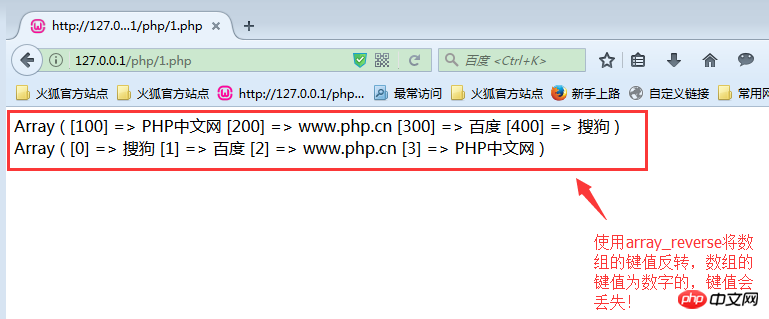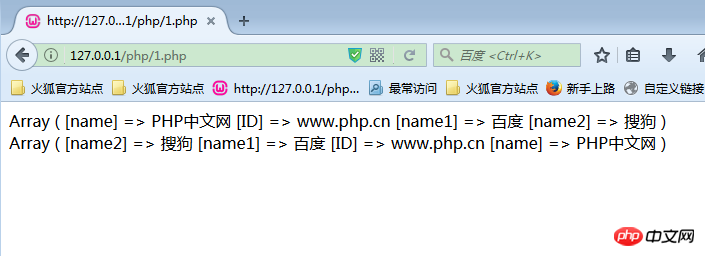 Backend Development
Backend Development
 PHP Tutorial
PHP Tutorial
 Detailed explanation of examples of random shuffling and reverse ordering of PHP arrays
Detailed explanation of examples of random shuffling and reverse ordering of PHP arrays
Detailed explanation of examples of random shuffling and reverse ordering of PHP arrays
May 04, 2017 am 11:38 AMRandom shuffling and reverse order of PHP arrays
In the first two articles "How to sort PHP arrays" and " PHP Array Reverse Order" introduces two sets of functions, one in ascending order and one in reverse order (descending order). Today, in this article, we will introduce to you the random order and reverse order of arrays!
1. What is random disorder? (shuffle)
#shuffle is to disrupt the array.
Use the shuffle function to randomly sort the elements in the array.
The shuffle syntax structure is as follows:
bool shuffle ( array &$array )
| Parameters | Description |
| array | Required. Specifies the array to adapt to. |
This function scrambles (randomly arranges the order of cells) an array. It uses a pseudo-random number generator and is not suitable for cryptography situations.
shuffle instance usage:
Let’s take an example to explain the shuffle function in detail. The specific code is as follows:
<?php
header("Content-Type:text/html; charset=utf-8");
$arr=array("name" => "PHP中文網(wǎng)", "url" => "m.miracleart.cn", "tom" => "100","hank" => "60");
shuffle($arr); // 將數(shù)組的值隨機(jī)排序
print_r($arr);
?>The output result is:

The above example will output different results every time you refresh the browser. I won’t take more screenshots here. You can try it locally!
Note: After the associative array is shuffled, the keys will be lost, as you should be able to see from the above example!
2. What is reverse order? (array_reverse)
array_reverse — Returns an array with the reverse order of the cells. Reverse order is to reverse the order of each element in an original array,
The syntax format of array_reverse is as follows:
array array_reverse ( array $array [, bool $preserve_keys = false ] )
array_reverse() accepts array array as input and returns a new array with the cells in reverse order. If preserve_keys is TRUE, the original key names are retained.
Instructions:
1. Reverse order ≠ Descending order
2. If The array is an associative array
When the key is a character, the reverse order will not be affected, the key will still be retained
When the key is a number, after the reverse order The default keys will be reset to 0, 1, 2...
When the second parameter is true, the keys are numbers, and the numeric keys are retained in reverse order
Let’s look at the example code of when the key is a number:
<?php
header("Content-Type:text/html; charset=utf-8");
$arr=array("100" => "PHP中文網(wǎng)", "200" => "m.miracleart.cn", "300" => "百度","400" => "搜狗");
$array = array_reverse($arr);//數(shù)組反序,將數(shù)組的元素反轉(zhuǎn)
print_r($arr);
echo "<br>";
print_r($array);
?>The output result is:

The key is Keep the key value when numbersSample code:
<?php
header("Content-Type:text/html; charset=utf-8");
$arr=array("100" => "PHP中文網(wǎng)", "200" => "m.miracleart.cn", "300" => "百度","400" => "搜狗");
$array = array_reverse($arr,true);//數(shù)組反序,將數(shù)組的元素反轉(zhuǎn)
print_r($arr);
echo "<br>";
print_r($array);
?>The output result is:

As can be seen from the above code, the key is When numbers are used, the key value is retained, which means the second parameter of array_reverse is true!
The key is when the key is a characterSample code:
<?php
header("Content-Type:text/html; charset=utf-8");
$arr=array("name" => "PHP中文網(wǎng)", "ID" => "m.miracleart.cn", "name1" => "百度","name2" => "搜狗");
$array = array_reverse($arr);//數(shù)組反序,將數(shù)組的元素反轉(zhuǎn)
print_r($arr);
echo "<br>";
print_r($array);
?>The output result is:

array_reverse function When the array is reversed, if the key value is a string, the key value will be retained!
Note: When using the array_reverse function, the original array will not be affected, and a new array will be returned!
In this article we introduce the reverse order and disorder of the array. In the next article, we will introduce the equal division, replacement and interception of arrays. For detailed introduction, please read "Interception, equal division and replacement of partial arrays of PHP arrays"!
【Related tutorial recommendations】
Related topic recommendations: "php array (Array)"
Related video course recommendations: "Other array functions: array_rand()/array_sum()/shuffle()/range()》
The above is the detailed content of Detailed explanation of examples of random shuffling and reverse ordering of PHP arrays. For more information, please follow other related articles on the PHP Chinese website!

Hot AI Tools

Undress AI Tool
Undress images for free

Undresser.AI Undress
AI-powered app for creating realistic nude photos

AI Clothes Remover
Online AI tool for removing clothes from photos.

Clothoff.io
AI clothes remover

Video Face Swap
Swap faces in any video effortlessly with our completely free AI face swap tool!

Hot Article

Hot Tools

Notepad++7.3.1
Easy-to-use and free code editor

SublimeText3 Chinese version
Chinese version, very easy to use

Zend Studio 13.0.1
Powerful PHP integrated development environment

Dreamweaver CS6
Visual web development tools

SublimeText3 Mac version
God-level code editing software (SublimeText3)

Hot Topics
 Why We Comment: A PHP Guide
Jul 15, 2025 am 02:48 AM
Why We Comment: A PHP Guide
Jul 15, 2025 am 02:48 AM
PHPhasthreecommentstyles://,#forsingle-lineand/.../formulti-line.Usecommentstoexplainwhycodeexists,notwhatitdoes.MarkTODO/FIXMEitemsanddisablecodetemporarilyduringdebugging.Avoidover-commentingsimplelogic.Writeconcise,grammaticallycorrectcommentsandu
 How to Install PHP on Windows
Jul 15, 2025 am 02:46 AM
How to Install PHP on Windows
Jul 15, 2025 am 02:46 AM
The key steps to install PHP on Windows include: 1. Download the appropriate PHP version and decompress it. It is recommended to use ThreadSafe version with Apache or NonThreadSafe version with Nginx; 2. Configure the php.ini file and rename php.ini-development or php.ini-production to php.ini; 3. Add the PHP path to the system environment variable Path for command line use; 4. Test whether PHP is installed successfully, execute php-v through the command line and run the built-in server to test the parsing capabilities; 5. If you use Apache, you need to configure P in httpd.conf
 PHP Syntax: The Basics
Jul 15, 2025 am 02:46 AM
PHP Syntax: The Basics
Jul 15, 2025 am 02:46 AM
The basic syntax of PHP includes four key points: 1. The PHP tag must be ended, and the use of complete tags is recommended; 2. Echo and print are commonly used for output content, among which echo supports multiple parameters and is more efficient; 3. The annotation methods include //, # and //, to improve code readability; 4. Each statement must end with a semicolon, and spaces and line breaks do not affect execution but affect readability. Mastering these basic rules can help write clear and stable PHP code.
 What is PHP and What is it Used For?
Jul 16, 2025 am 03:45 AM
What is PHP and What is it Used For?
Jul 16, 2025 am 03:45 AM
PHPisaserver-sidescriptinglanguageusedforwebdevelopment,especiallyfordynamicwebsitesandCMSplatformslikeWordPress.Itrunsontheserver,processesdata,interactswithdatabases,andsendsHTMLtobrowsers.Commonusesincludeuserauthentication,e-commerceplatforms,for
 PHP 8 Installation Guide
Jul 16, 2025 am 03:41 AM
PHP 8 Installation Guide
Jul 16, 2025 am 03:41 AM
The steps to install PHP8 on Ubuntu are: 1. Update the software package list; 2. Install PHP8 and basic components; 3. Check the version to confirm that the installation is successful; 4. Install additional modules as needed. Windows users can download and decompress the ZIP package, then modify the configuration file, enable extensions, and add the path to environment variables. macOS users recommend using Homebrew to install, and perform steps such as adding tap, installing PHP8, setting the default version and verifying the version. Although the installation methods are different under different systems, the process is clear, so you can choose the right method according to the purpose.
 Your First PHP Script: A Practical Introduction
Jul 16, 2025 am 03:42 AM
Your First PHP Script: A Practical Introduction
Jul 16, 2025 am 03:42 AM
How to start writing your first PHP script? First, set up the local development environment, install XAMPP/MAMP/LAMP, and use a text editor to understand the server's running principle. Secondly, create a file called hello.php, enter the basic code and run the test. Third, learn to use PHP and HTML to achieve dynamic content output. Finally, pay attention to common errors such as missing semicolons, citation issues, and file extension errors, and enable error reports for debugging.
 How Do You Handle File Operations (Reading/Writing) in PHP?
Jul 16, 2025 am 03:48 AM
How Do You Handle File Operations (Reading/Writing) in PHP?
Jul 16, 2025 am 03:48 AM
TohandlefileoperationsinPHP,useappropriatefunctionsandmodes.1.Toreadafile,usefile_get_contents()forsmallfilesorfgets()inaloopforline-by-lineprocessing.2.Towritetoafile,usefile_put_contents()forsimplewritesorappendingwiththeFILE_APPENDflag,orfwrite()w
 python if else example
Jul 15, 2025 am 02:55 AM
python if else example
Jul 15, 2025 am 02:55 AM
The key to writing Python's ifelse statements is to understand the logical structure and details. 1. The infrastructure is to execute a piece of code if conditions are established, otherwise the else part is executed, else is optional; 2. Multi-condition judgment is implemented with elif, and it is executed sequentially and stopped once it is met; 3. Nested if is used for further subdivision judgment, it is recommended not to exceed two layers; 4. A ternary expression can be used to replace simple ifelse in a simple scenario. Only by paying attention to indentation, conditional order and logical integrity can we write clear and stable judgment codes.





